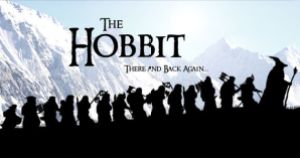
 Never before in Hollywood history has a prequel novel such as “The Hobbit” – the standalone first book in English fantasy writer J.R.R. Tolkien’s Middle Earth series – taken on such grand and epic proportions on the silver screen. New Zealand director Peter “Wingnut Films” Jackson, motivated by narrative license and the lucre of the franchise, divided Tolkien’s there-and-back-again “Hobbit” story into three films, and is back in theaters this month with part three, which is also his sixth and final Lord Of The Rings (LOTR) movie.
Never before in Hollywood history has a prequel novel such as “The Hobbit” – the standalone first book in English fantasy writer J.R.R. Tolkien’s Middle Earth series – taken on such grand and epic proportions on the silver screen. New Zealand director Peter “Wingnut Films” Jackson, motivated by narrative license and the lucre of the franchise, divided Tolkien’s there-and-back-again “Hobbit” story into three films, and is back in theaters this month with part three, which is also his sixth and final Lord Of The Rings (LOTR) movie.
For Middle Earth lovers, “The Hobbit, Part Trois” is jam-packed with, um, just about everything. Arresting vistas, gargantuan battles, evil orcs, stirring landscapes, axe-wielding dwarves, soaring Eagles, the immortal wizard Gandalf, and Smaug the Dragon (voiced by the hot-as-your-daddys-wood-stove English actor Benedict Cumberbatch, whose legion of “Cumberbitches” tweet #SmaugIsSexy” messages on Twitter with reckless abandon). And did I mention the lovely and talented Evangeline Lilly as the perfectly-cast Tauriel, whose pointy ears are as sharp as her sword and even more beautiful? (The poor lady Lilly, despite her protestations, is again cast in yet another “Lost-like” love triangle – though this one is inter-species. #FaintSpoilerAlert).
Given all this “Battle of the Five Armies” mayhem, it is easy to forget that “The Hobbit,” at day’s end, is about, well, a hobbit. For those of us who still consider ourselves People of the Book, Bilbo Baggins served as most readers’ initial introduction, not only to the world of Middle Earth, but to the limitations, motivations, and potentialities of one tiny creature. Born in Bag End, Hobbiton, Bilbo is a small and unassuming hairy-footed fellow from the tranquil meadows and woods of the Shire who strives very hard to be ordinary – nothing but tasty food, good drink, an evening smoke, and decent company from time to time, he fancies. As Tolkien’s story goes, of course, Bilbo finds himself cast into extraordinary circumstances in which he will play a pivotal part.
And this is really the magic of “The Hobbit,” a story that resonates powerfully for us Vermonters in this unique time in human history. We Green Mountain dwellers who inhabit the northeastern rural frontier of the largest and powerful nation/empire in world history are living in extraordinary times. Many who know me know that I am fond of referring to Vermont as the Shire, which it most certainly is, once one ventures beyond our beautiful and billboard-less forests and fields, meadows and mountains, out and away and into our larger global community.
And, like Bilbo in the Shire, we Vermonters are sometimes-unwilling participants in larger global struggles that often seem beyond our control. The twin 21st century forces of climate change and Peak Oil, phenomena of our own century-old making, appear to threaten our relatively comfortable life as we know it (you know – food, drink, the company of neighbors, and a good smoke or ski from time to time.) Fracking’s explosive forces, tapped to feed our military/industrial/energy complex and an aggressive U.S. imperial foreign policy of “full spectrum dominance” over the whole Earth and outer space (the Pentagon burns 1 million barrels of oil daily, the single largest energy-devouring Monster on the planet), smells a bit like evil wizard Sauruman’s tree-destroying industrial army of orcs and wargs harnessing nature’s power for their nefarious power-hungry ends. The all-seeing eye of Sauron, meanwhile, in the form of the NSA (No Such Agency) and Google, ramps up its surveillance of us all, networked together as we are into a global Machine built on binary code and our collective keystroking labor.
The beauty of Bilbo, of course, is that he ultimately chooses to engage in this larger struggle – reluctantly, at first, and with much hemming and hawing about giving up his creature comforts. The genuine fear Bilbo feels, stepping out beyond the immediate and the known, is palpable. But engage Mr. Baggins does, and in so doing, he discovers many wondrous things about truly living. Bilbo finds himself having to trust in other creatures; to appreciate the wisdom of his elders; to learn from those who are not like him; to push beyond his own boundaries; to challenge with grace and humility his friends and fellow travelers; and to tap into an inner strength and tenacity he did not really know he possessed – until he leaves the Shire behind him and embraces the adventure.
As Peter Jackson delivers his final Middle Earth tour-de-force, let us remember these essential truths embedded in the LOTR stories as we journey to there and back again. It is the dying dwarf-king Thorin who delivers what may be the best line in the entire LOTR canon: “If more people valued home above gold,” he says to Bilbo as the life pours out of his body, “the world would be a merry place.” Amen, Merry December, and may the new year bring us new courage and conviction.
- All
- Agriculture
- Arts & Culture
- Book Reviews
- Civil Liberties
- Decentralism & The Vermont Tradition
- Education
- Empire and Overshoot
- Environment
- Featured Content
- Features
- Film Reviews
- Finance & Money
- Food
- Fuel & Energy
- Global Problems, Local Solutions
- Homestead Security
- Information & Media
- Interviews
- Military
- Most Likely to Secede
- Music Reviews
- Politics
- Resilience & Community
- Sovereignty & Secession
- Uncategorized
- Vermont Commons

You must be logged in to post a comment.